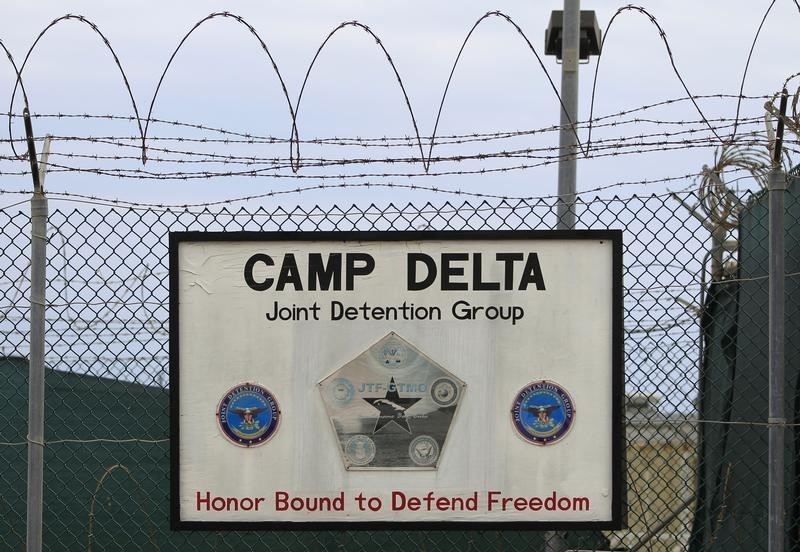By Matt Spetalnick and David Rohde
WASHINGTON (Reuters) - The United States has secured commitments from a dozen countries to accept nearly half of the 52 Guantanamo prisoners already cleared for transfer, U.S. officials said on Friday, as the Obama administration tries to accelerate efforts to close the military prison.
But the moves will require the final signature of Defense Secretary Ash Carter, which could still delay the process, despite President Barack Obama's push to empty the prison before he leaves office in 2017.
With the White House drafting a broader plan to shut the facility, the office of the State Department's Guantanamo envoy has finalized deals with several foreign governments and is in advanced negotiations with others, the senior officials told Reuters.
They said the transfers from the prison at the U.S. Naval Base in Guantanamo Bay, Cuba, which has drawn international condemnation for the harsh treatment of foreign terrorism suspects held there, could take place by the end of the year, whittling down the current prisoner population of 116.
Obama has faced opposition from congressional Republicans who passed laws blocking any move to transfer Guantanamo inmates to prisons in the United States. The White House says it is crafting a detailed proposal it will present to Congress soon for shutting the facility.
The State Department is pushing ahead with one of the main thrusts of Obama's strategy: sending home or resettling elsewhere as many as possible of the 52 prisoners who have been ruled safe for release.
One official, speaking on condition of anonymity, said there were "political commitments at various stages" with U.S. allies and partners around the world. Some have accepted detainees before and others will be doing so for the first time.
The main focus is on dozens of Yemenis no longer considered security risks. Washington has ruled out repatriating them because of the war in their homeland.
PRESSURE ON PENTAGON
Much will depend on how fast the Pentagon is willing to do its part, as well as how quickly inter-agency reviews unfold.
The White House has pressured Carter to expedite approval of proposed transfers, essentially to act within 30 days on each case, a source close to the matter said.
By law, the defense secretary has the final say on moving a prisoner and is responsible if he returns to militant activities. The slow pace under Carter's predecessor, Chuck Hagel, led to a falling-out with Obama's White House. Hagel resigned in November.
So far this year, four Yemeni prisoners were sent to Oman and one to Estonia in January, and in June six Yemenis were flown to Oman.
U.S. officials say they hope to ramp up the transfers under the new State Department envoy, Lee Wolosky, to help cut down the prison population to an "irreducible minimum." Accelerated reviews are planned for those deemed "too dangerous to release" to see if any can be added to the transfer list.
The plan being drafted will call for possibly dozens who remain to be moved to the United States and held in federal "Supermax" penitentiaries or military prisons, Obama's counterterrorism adviser, Lisa Monaco, told a recent conference.
This proposal would set up a major fight with Congress.
White House spokesman Josh Earnest said work on the plan was continuing and that it would likely be presented to Congress after it returns from summer recess in early September.
The prison was opened by President George W. Bush, after the Sept. 11, 2001 attacks to house suspected al Qaeda and Taliban members rounded up overseas.

Obama has repeatedly pledged to close the facility, where most detainees have been held for more than a decade without trial. It now holds less than half of the number of prisoners it did when he took office in 2009.